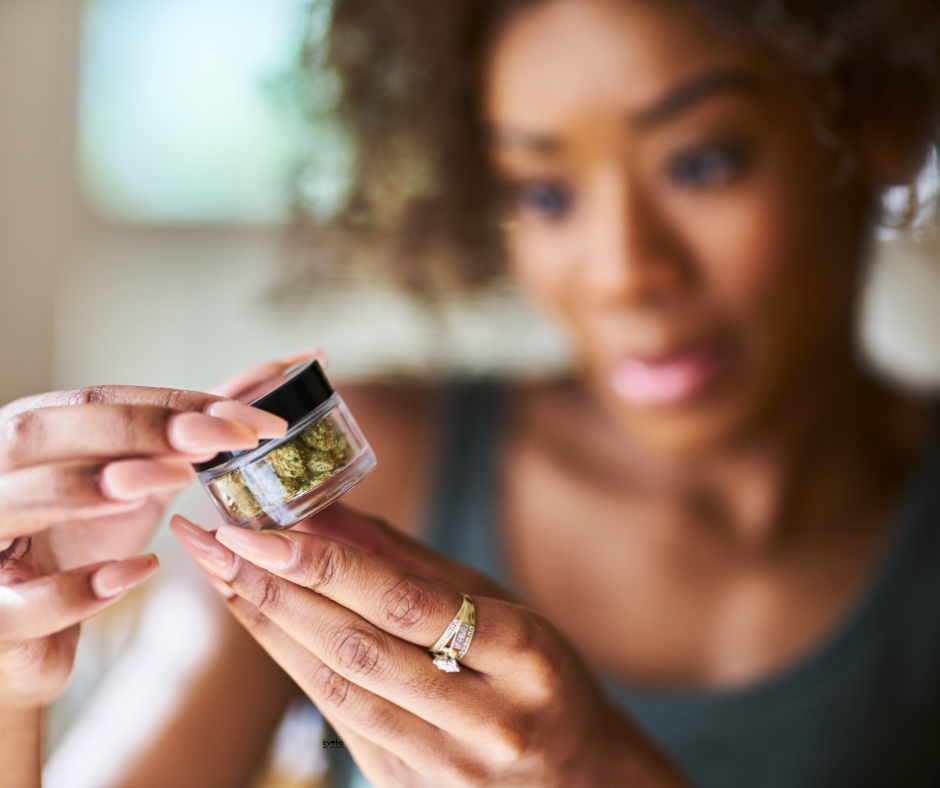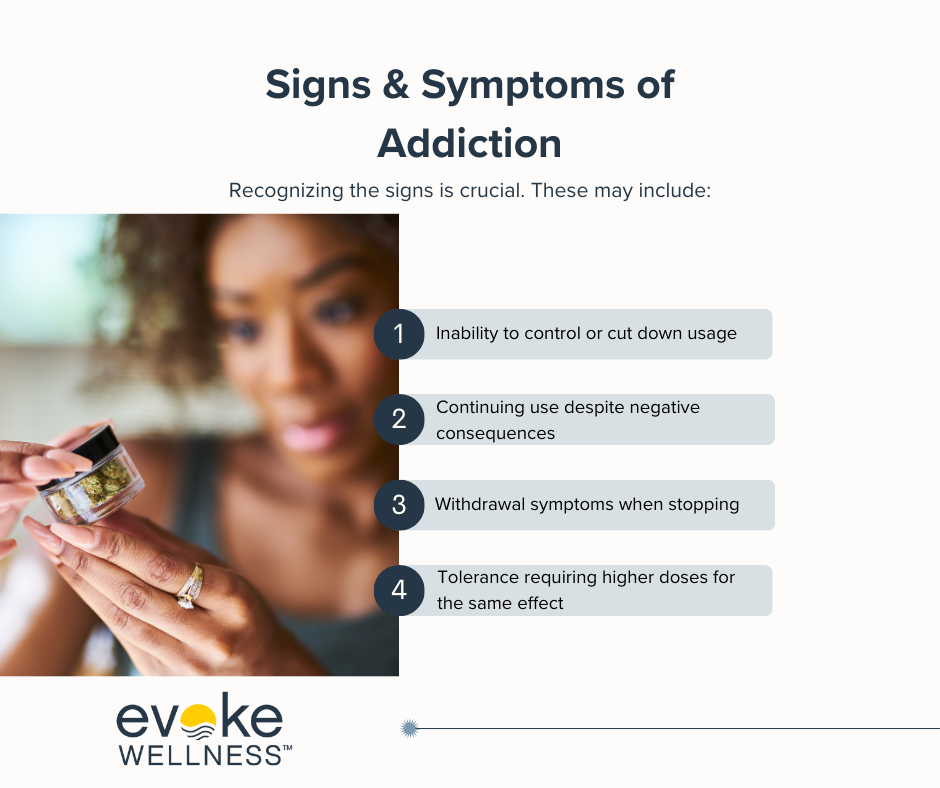As cannabis use becomes increasingly prevalent in today’s culture, you may find yourself grappling with marijuana dependence. Recent studies show that approximately 30% of users develop some degree of marijuana use disorder. Addressing this issue requires a comprehensive approach to detoxification and recovery. At Evoke Wellness at Cohasset, we understand the complexities of marijuana detox and offer tailored solutions to guide you through this challenging process. Our evidence-based programs incorporate medical detox, substance abuse treatment, and group therapy to support your journey towards lasting sobriety. In this article, we’ll explore effective strategies for overcoming marijuana dependence and reclaiming control of your life in today’s cannabis-centric society.
Together, let’s embrace the journey to recovery and the promise of a new beginning. Call us at (617) 917-3485 today or reach out online.
Understanding the Landscape of Cannabis Consumption
Cannabis remains one of the most widely used substances globally, with an estimated 19.8 million Americans aged 12 or older reporting past-month use as of 2013. This prevalence underscores the urgency of examining current trends and their impact on public health.
Usage Patterns and Trends
Daily or near-daily cannabis consumption has risen alarmingly, increasing from 5.1 million individuals between 2005-2007 to over 8.1 million in 2013. Moreover, recent data indicates that cannabis use has spiked across all age groups, with over 52 million users (19% of the population) in 2021, compared to just 11% in 2002.
Potency and Product Landscape
Concurrently, the potency of cannabis products has escalated, with the concentration of delta-9-THC – the primary psychoactive compound – nearly quadrupling between 1995 and 2019. This surge, coupled with the expanding availability of other cannabinoids like CBD and delta-8-THC, has reshaped the landscape of cannabis consumption.
Dependence and Treatment Gaps
Despite the high rates of use, only 845,000 individuals received treatment for cannabis use disorder in 2023, leaving a vast majority untreated. Rates of dependence are as high as 42% among heavy users and 9% among all users, underscoring the pressing need for accessible and effective interventions.
While psychotherapeutic approaches like cognitive-behavioral therapy and motivational enhancement therapy have demonstrated moderate efficacy, abstinence rates remain modest, and relapse is common after treatment completion. Pharmacological interventions, such as N-acetylcysteine and gabapentin, have shown promise as adjuncts to psychosocial treatment, but no clearly efficacious pharmacotherapy has emerged.
Preventing Cannabis Use Disorders: A Proactive Approach
Early Intervention and Education
Prevention strategies centered on early intervention and education can play a pivotal role in mitigating cannabis use disorders. Providing accurate, age-appropriate information about the potential risks and consequences of cannabis use, particularly for adolescents and young adults, is crucial. According to SAMHSA, youth and individuals with concurrent psychiatric or substance use disorders are at higher risk of cannabis-related harms.
By promoting awareness and fostering open dialogues within families, schools, and communities, individuals can make informed decisions and develop healthy coping mechanisms, reducing the likelihood of problematic cannabis use.
Addressing Underlying Factors
Effective prevention efforts should also address underlying factors that may contribute to the development of cannabis use disorders. NIDA research suggests integrating psychosocial approaches like cognitive-behavioral therapy, motivational enhancement therapy, and contingency management to address psychological, social, and environmental influences.
Additionally, providing support for co-occurring mental health conditions, such as anxiety or depression, can help mitigate the risk of individuals turning to cannabis as a means of self-medication.
Promoting Healthier Lifestyles
Encouraging the adoption of healthier lifestyles and alternative coping strategies can serve as protective factors against cannabis use disorders. Evoke Wellness offers toolkits and resources to support community-based prevention efforts, emphasizing the importance of engaging in positive activities, developing strong social connections, and cultivating resilience.
By fostering a supportive environment and promoting overall well-being, individuals may be less likely to turn to substance use as a means of coping or seeking temporary relief.
Harm Reduction Strategies
While abstinence remains the safest approach, harm reduction strategies can be beneficial for individuals who choose to use cannabis. The Lower Risk Cannabis Use Guidelines (LRCUG) provide evidence-based recommendations, such as using products with lower THC potency, avoiding smoking, and limiting the frequency and intensity of use.
By disseminating these guidelines and promoting responsible use practices, individuals can make informed decisions and potentially mitigate the risks associated with cannabis consumption.
Criteria for Cannabis Dependence: Recognizing the Signs
Problematic Patterns
Cannabis use disorder (CUD) refers to a problematic pattern of cannabis consumption leading to clinically significant impairment or distress. As defined in the DSM-5, CUD is diagnosed when at least 2 of 11 specific criteria are met within a 12-month period. These include using more cannabis than intended, unsuccessful efforts to cut down, excessive time spent obtaining and using the drug, cravings, and continued use despite recurrent issues caused or exacerbated by cannabis. According to the CDC, signs of CUD also encompass neglecting important activities, using in hazardous situations, and needing increased amounts to achieve the desired effects (tolerance).
Risk Factors & Prevalence
Certain factors heighten the risk of developing CUD, such as early initiation of cannabis use during adolescence and frequent, heavy consumption patterns. Research indicates that around 9% of cannabis users experience addiction, often beginning in their teenage years. Moreover, the potency of cannabis products has increased significantly, with some containing very high concentrations of THC, potentially leading to overconsumption and adverse effects. Young adults who use high-THC cannabis may face an elevated risk of continued use and future mental health issues.
Cognitive & Functional Impairments
While the intoxicating effects of cannabis can include euphoria and sensory enhancement, prolonged and heavy use can also result in cognitive impairments, mental dullness, and social withdrawal. According to addiction experts, individuals with CUD may struggle with attention, memory, learning difficulties, and overall diminished performance in major life areas like work or school. Behavioral signs of abuse include secretiveness, legal troubles, financial issues, and an excessive focus on obtaining and using cannabis.
Treatment Approaches
Addressing CUD often involves counseling, therapy, and addressing any co-occurring mental health conditions. Experts note that developing a strong sense of self-efficacy – the belief in one’s ability to resist cannabis use – is crucial for long-term abstinence. While no medications are currently FDA-approved for CUD, innovative interventions like peer network counseling, intensive outpatient programs, and cognitive-behavioral therapy show promise in improving overall function and facilitating recovery.
Substance Abuse Treatment: Addressing Marijuana Dependence
Recovery Through Medical Detox
Overcoming marijuana dependence often begins with a medical detox program to manage withdrawal symptoms. At Evoke Wellness Centers, individuals can receive round-the-clock medical supervision and personalized treatment plans tailored to their specific needs. This structured environment supports a safe and comfortable detox process, preparing the body and mind for further rehabilitation.
Comprehensive Treatment Pathways
Following detox, a comprehensive treatment approach is essential for long-term recovery. Evoke Wellness offers evidence-based therapies like cognitive-behavioral therapy (CBT) and dialectical behavior therapy (DBT), addressing the root causes of addiction. These therapies equip individuals with coping mechanisms and relapse prevention strategies.
The Power of Group Support
Group therapy plays a pivotal role in marijuana addiction treatment. By fostering a supportive community, individuals can share experiences, gain insights, and draw strength from others on a similar journey. Group sessions facilitate accountability, encourage personal growth, and provide a safe space for open discussions about the challenges of recovery.
Holistic Healing Approaches
In addition to traditional therapies, Evoke Wellness incorporates holistic healing methods into their treatment programs. Activities like art therapy, music therapy, meditation, and yoga offer healthy alternatives to substance use, promoting mindfulness, stress relief, and overall well-being. These complementary approaches empower individuals to develop positive coping strategies and find fulfillment without relying on marijuana.
Navigating the Road to Recovery: Marijuana Detox and Beyond
The Prevalence of Marijuana Use Disorder
According to recent data, approximately 14.2 million Americans aged 12 and older (5.1% of the population) had a cannabis use disorder in 2020. While many can use marijuana recreationally, some individuals develop a dependence, characterized by an inability to stop using despite negative consequences. The risk varies, with an estimated 25-50% of daily users developing addiction.
Withdrawal Symptoms and Challenges
Quitting marijuana can trigger withdrawal symptoms like irritability, insomnia, cravings, depression, and changes in sleep and eating patterns. These symptoms can increase the risk of relapse and impact overall well-being, underscoring the importance of professional support during detox and recovery.
Comprehensive Treatment Approach
Overcoming marijuana addiction often requires a multifaceted approach. Cognitive-behavioral therapy, motivational incentives, and support groups are therapeutic approaches that can aid in the recovery process. Evoke Wellness Centers offers personalized treatment programs, including medical detox, residential treatment, and various therapy options, to support individuals in achieving long-lasting sobriety.
Holistic Healing for Lasting Recovery
At Evoke Wellness Centers, the focus is on healing the mind, body, and spirit to achieve lasting recovery. Specialized treatment for co-occurring mental health conditions, such as anxiety and depression, is available to address the underlying causes of addiction. The center’s programs are designed to guide clients through the entire recovery journey, from initial detox to long-term aftercare services.
FAQ: Addressing Dependence in Today’s Cannabis Culture
Understanding Marijuana Dependence
Marijuana dependence is a growing concern, with 30% of users potentially developing some degree of marijuana use disorder. While not as life-threatening as other substances, overcoming this addiction can be equally challenging. The increasing potency of marijuana, with average THC levels surpassing 15%, heightens the risks.
Seeking Professional Support
Attempting to quit alone can be daunting. Professional support from accredited treatment centers like Evoke Wellness can significantly increase the chances of successful recovery. Their comprehensive programs offer:
- Medically-supervised detox
- Evidence-based therapies (CBT, group counseling)
- Dual diagnosis treatment for co-occurring disorders
- Aftercare and relapse prevention planning
Family & Community Impact
The effects of marijuana addiction extend beyond the individual. Nearly half of U.S. families have experienced substance abuse issues, impacting communities through increased crime, homelessness, and exposure to drug culture. Open communication and seeking help are crucial for breaking the cycle.
Overcoming Stigma & Embracing Recovery
While societal attitudes towards marijuana have shifted, addiction remains a serious issue. By addressing it proactively and seeking professional care, individuals can reclaim their lives and families can heal. Recovery is possible with the right support system and evidence-based treatment approach.
Conclusion
Navigating marijuana detox can be challenging, but with proper support and treatment, recovery is achievable.
Recent studies show that 30% of marijuana users may develop some degree of marijuana use disorder. However, evidence-based treatments have proven effective, with success rates as high as 50% for those who complete a comprehensive program. By seeking professional help and committing to your recovery, you can overcome marijuana dependence and reclaim control of your life. Remember, each step forward is a victory, and a healthier, substance-free future is within your reach.
Begin Your Journey with Evoke Wellness at Cohasset
If you or a loved one is considering treatment, Evoke Wellness at Cohasset invites you to contact us. Our compassionate team is ready to answer your questions, discuss your needs, and help you take the first steps toward recovery. In Cohasset, you’ll find more than just a treatment program – you’ll discover a community dedicated to your wellness and success. Together, let’s embrace the journey to recovery and the promise of a new beginning. Call us at (617) 917-3485 today or reach out online.





